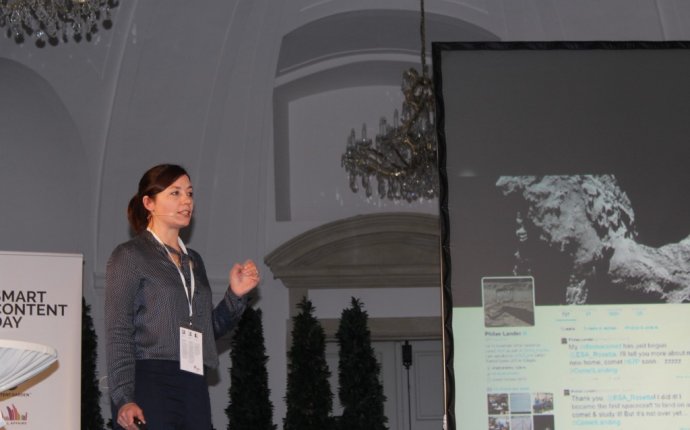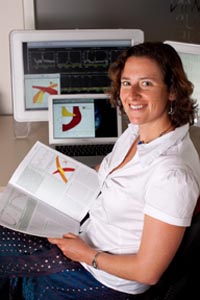
Astrophysics degree Jobs
(A perspective by Dr Tamara Davis, Research Fellow at the University of Queensland)
If you're anything like me, then when starting university you would have had no idea what a career in astrophysics research might look like. Or even, if you graduated with a physics/astrophysics degree where else that might take you. Well, the answer is that it takes you all around the world to work at amazing places with amazing people. I figure it has to be one of the best jobs in the world.
So to help you out here's a little overview of life as an astrophysicist. I'll start by going through the steps to become a researcher, but then also go through what some might think of as back-up plans, and others might think  of as the primary plan, of what to do with your physics degree if you decide not to go into research.
of as the primary plan, of what to do with your physics degree if you decide not to go into research.
Getting your Ph.D
To become a professional astrophysicist you need to do an undergraduate degree in physics, with an honours year, and then do a PhD (a doctorate). The details change from country to country, but in Australia that's the deal. An honours year is a year that is half-research, half-coursework, that gives you a taste for what research is all about and gives you a chance to show off your potential. If you do well enough in honours in Australia you can go straight into a PhD, otherwise you can try a masters (which is required in some other countries). A masters involves a longer research project, usually two years.
The PhD is the proving ground for a researcher. In Australia, they are generally three years, and you get paid a scholarship while doing it. You may have heard that PhD's are hard work, and it's true, but they're also great fun. You work closely with an experienced researcher, but it is your chance to choose a project that you're inspired by and take the lead. Your supervisor makes sure you are on track and helps you select a project that is significant, timely, and possible. But the research is yours, and you really get to put your mark on the field. By the end of your PhD you'll be a published researcher, with several articles published in professional journals.
Becoming a researcher
Once you have a PhD, you're on your way to a research career. Typically there are a few more steps in the chain before you get a permanent job. First step, postdoctoral researcher. Often people describe these as the most productive times in their scientific careers - the point at which you have the knowledge and skills to do significant research efficiently, but before other responsibilities start taking over. These are usually 2-4 year jobs, and usually you will take a couple of these in a couple of different countries before lining yourself up with a permanent position.
Permanent positions come in two main types: research only or research combined with teaching. Generally speaking the latter are usually only found in universities, while the former (research only) occur in both universities and research institutions like the CSIRO.
As a professional astrophysicist you have a great range of tasks and variety in your work. You're a self-directed researcher, sometimes researching within a big collaboration, sometimes on your own, but usually with a lot of autonomy. Your hours are flexible and although we tend to work quite long hours it doesn't always feel that way, because (for me at least) I'm doing something that I'd happily do as a hobby if I wasn't being paid for it. The flexibility means you can come to work early if you like and leave early, or come late and leave late, and it is quite easy to get days off when you want them or to arrange to work from home occasionally. As long as you produce significant research it doesn't matter where or how you do it.
Teaching restricts that flexibility somewhat, but it is a rewarding part of the job as well. There are widely varying quantities of teaching in different astrophysics jobs, but one of the best parts is taking on graduate students and working with them during their PhD. It is fantastic to see someone bloom as they use new skills to discover new explanations of phenomena in the universe.
Working with the media and general public
Another aspect of the job is working with the media and the general public. Because so many people are so fascinated by astrophysics there is ample opportunity to discuss the latest in the field, you're frequently asked for new astronomy news to publicise, and invited to give public talks. This can be a lot of fun.
More (fun) coordinating tasks...
As you mature in your career you'll start doing more coordinating tasks, by which I mean designing new projects, coordinating other researchers, designing the telescopes and instruments needed to make the observations, and writing the funding requests necessary to get the money needed to make those projects a success. You'll also be asked for your expert opinion to referee other people's research to decide whether it is worthy of publication. Some of these tasks can be a drag, but it means that you're getting the chance to guide progress in your field and lead something truly substantial.
Fancy yourself as a globetrotter?
All in all it makes for an interesting and exciting work life, with never a dull moment. Since research is so international, much of the above will be done in other countries and you have to travel around the world to collaborate with the top people in your field and present your work at international conferences. Travelling for a few months each year is not unusual, and the big telescopes are in fun places like Hawaii and Chile.
For many astrophysicists the travel and international collaborations represents a fantastic opportunity to see the world. However, it can become a hardship - especially if you need to coordinate that travel around a family or other commitments. Typically it is necessary to spend several years overseas in various postdoctoral positions and if you are limited to a certain location then it can be hard to find a job at the time you need one. For an idea of the number and scope of astrophysics positions available at any particular time you can check out the American Astronomical Society's Job Register at .
More about research...
Research is actually a well-paid job - way above the average wage. Sometimes we like to give it a bad wrap, because the pay isn't great compared to what you can do with a physics degree if you leave research. Typically physicists become bankers, finance analysts, management consultants, or work in medical physics, mining, or the environment. Basically any job that requires analysis skills and a knowledge of how to use mathematics to describe the real world. There's a high demand for such people, and therefore physicists who take up such jobs are usually very well paid, making our research salaries a little tame in comparison. (But really we're all doing very well.)
where to go from london who product specific guidance where design software how many engineering graduates per year which equipment is required for surgical hand asepsis which manager has the most ejections when system is in working state asus where to set up an ira why entrepreneurs don't have girlfriends how often should you forecast where is stonehenge from london what is prod date whom synonyms and antonyms when startup become unicorn why system ui stopped working who product registration what science is taught in 11th grade which development was influenced by the enlightenment who product specification startup where is izzy how much business credit can i get where is primitive technology from how many technology standard e commerce has how often should you use stim why device drivers are used when startup menu where is technology made how much start up money small business how many entrepreneurs are there in the world where is maya from project runway junior how community solutions when business taxes due 2022 how much solution to put in contact case how far london to paris what project are you most proud of where to find device name on laptop why product photography is important how much technology should be used in the classroom when management doesn't listen how often do you use acapella device where science gives life mmbn3 why teaching is a good career how many entrepreneurs have adhd where to buy entrepreneur magazine how many project runway seasons where to find science articles what company owns tiktok why management is important which solutions are isotonic what tech calls thinking which london airport is better what's road map what solution does walter have who project in kenya when project price should be discussed how much project manager earn in india how much project manager earn in uk how much solution in lateral flow test road map what is meaning what products have titanium dioxide where to find company utr weathertech how many solution are there for equation log4 x 1 who london office startup whom why technology is good when business invest funds to expand where startup folder windows 10 where is development panel in jira where is tommy from design inc where the solutions to the identified problems presented how many science questions are on the teas where project adam was filmed an equipment whose power is 1500w when up start how teaching methods affect learning how much design logo when system has no solution why start up business fail when product backlog retire what's start up what tech stocks to buy how much developer to bleach where lauren london from when manufacturers give back where are you from teaching ideas what manufacturer makes jeep what system is the heart in how many business weeks in a year where project eclipse what teaching means to me how much company match 401k how much start up capital is required startup company why development matters what teaching subject pays the most startup who is vera how much engineering cost in india where from lg company what business to start in 2022 where to go from business analyst how tech works how much develop film where to produce the symbol of the king when set up care where solutions how much product manager make how much product manager make when london bridge is falling down when is start up season 2 when manufacturing date why product roadmap how products are manufactured who technology invented who started whose line is it anyway how much product photography cost where product definition who product specific guidance










